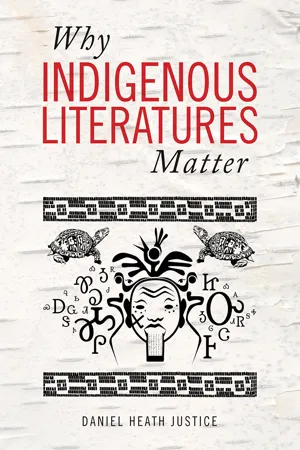
- 306 pages
- English
- PDF
- Available on iOS & Android
Why Indigenous Literatures Matter
About this book
Part survey of the field of Indigenous literary studies, part cultural history, and part literary polemic, Why Indigenous Literatures Matter asserts the vital significance of literary expression to the political, creative, and intellectual efforts of Indigenous peoples today.
In considering the connections between literature and lived experience, this book contemplates four key questions at the heart of Indigenous kinship traditions: How do we learn to be human? How do we become good relatives? How do we become good ancestors? How do we learn to live together? Blending personal narrative and broader historical and cultural analysis with close readings of key creative and critical texts, Justice argues that Indigenous writers engage with these questions in part to challenge settler-colonial policies and practices that have targeted Indigenous connections to land, history, family, and self. More importantly, Indigenous writers imaginatively engage the many ways that communities and individuals have sought to nurture these relationships and project them into the future.
This provocative volume challenges readers to critically consider and rethink their assumptions about Indigenous literature, history, and politics while never forgetting the emotional connections of our shared humanity and the power of story to effect personal and social change. Written with a generalist reader firmly in mind, but addressing issues of interest to specialists in the field, this book welcomes new audiences to Indigenous literary studies while offering more seasoned readers a renewed appreciation for these transformative literary traditions.
Awarded the NAISA Award Best Subsequent Book, 2018, PROSE Award, 2019, and shortlisted for ACQL Gabrielle Roy Prize for Literary Criticism, 2018.
Tools to learn more effectively

Saving Books

Keyword Search

Annotating Text

Listen to it instead
Information

Table of contents
- Cover
- Half Title
- Title
- Copyright
- Dedication
- Contents
- ACKNOWLEDGEMENTS
- PREFACE / Notes for the Long Rebellion
- Introduction Stories That Wound, Stories That Heal
- Chapter 1 How Do We Learn to Be Human?
- Chapter 2 How Do We Behave as Good Relatives?
- Chapter 3 How Do We Become Good Ancestors?
- Chapter 4 How Do We Learn to Live Together?
- Chapter 5 Reading the Rupture 1s
- Conclusion Keeping a Fire
- APPENDIX / A Year of # HonouringIndigenous Writers
- BIBLIOGRAPHIC ESSAY / Citational Relations
- COPYRIGHT ACKNOWLEDGEMENTS
- INDEX
Frequently asked questions
- Essential is ideal for learners and professionals who enjoy exploring a wide range of subjects. Access the Essential Library with 800,000+ trusted titles and best-sellers across business, personal growth, and the humanities. Includes unlimited reading time and Standard Read Aloud voice.
- Complete: Perfect for advanced learners and researchers needing full, unrestricted access. Unlock 1.4M+ books across hundreds of subjects, including academic and specialized titles. The Complete Plan also includes advanced features like Premium Read Aloud and Research Assistant.
Please note we cannot support devices running on iOS 13 and Android 7 or earlier. Learn more about using the app